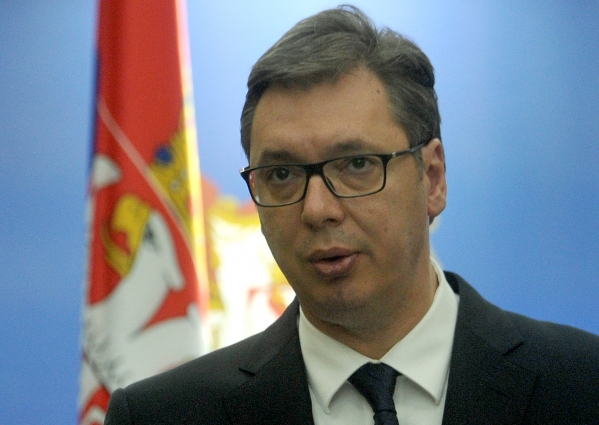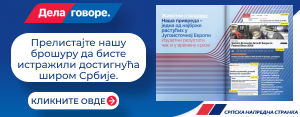
Vucic: Now is chance for Kosovo deal, but at what cost?
When NATO bombed Serbia in 1999, Aleksandar Vučić was information minister, enforcing censorship rules for the country’s president, Slobodan Milošević, who would later be indicted for war crimes.
Nearly two decades later, Vučić himself is Serbia’s president. Claiming to have shed many of his former nationalist views, and brushing off accusations of authoritarianism, he is now seen by the international community as the man who could sign an agreement that would eventually bring reconciliation over Kosovo.
The former province of Serbia pulled away from Belgrade under international supervision after the Nato air campaign, and proclaimed independence in 2008. Serbia still considers the territory its own.
In an interview with the Guardian in Belgrade this week, Vučić said he believed there is now a brief window of “six months or a year” in which it might be possible to sign a deal.
“We are ready to discuss every single issue, we are ready to take into consideration every single proposal that would mean a compromise solution,” he said, provided Serbia is offered something in return.
Kosovo is recognized by more than 100 nations, but there are still five EU countries that do not recognise it, mainly because they fear it could set a precedent for their own domestic territorial disputes. Nor do China, India and Russia.
The hope in Brussels is that a deal could be struck that would lead to Belgrade acknowledging if not formally recognising Kosovo’s independence, and would pave the way for Kosovo to take a seat at the UN and for both nations to begin a path towards EU membership.
Vučić has been playing up these hopes, but in return wants a package of benefits for Serbia. He is already involved in regular EU-supervised dialogue in Brussels with Kosovo’s president, Hashim Thaçi, which attempts to implement the provisions of an interim agreement signed five years ago. Thaçi also told the Guardian last week that he expected a comprehensive agreement to be reached this year.
Vučić has also spent the past months engaged in a whirlwind of meetings with western leaders, trying to convince them that they should offer a compromise solution that brings concrete benefits for Serbia rather than simply acquiesce to the facts on the ground.
That Vučić could be the one to sign the deal is remarkable, given that in the 1990s he was part of the Radical party, which sought a Greater Serbia and supported the Serb political and military formations fighting in Croatia, Bosnia and Kosovo.
Vučić, however, is a man of contradictions. He dominates the country’s political scene, having transformed the presidency from a largely ceremonial role to the centre of power after moving over from prime minister’s seat last year. Unlike other domineering leaders, however, there are no wild gesticulations or frothing oratory. His voice rarely rises above a mumble, and he uses whispered emotional appeals, portraying himself as a tireless martyr for the Serbian cause.
“I am squeezed on a daily basis,” he said. “It’s mainly Kosovo to tell you truth. Everything else is peanuts. I have invested at least 400 days so far in the last four years since I became prime minister, only on Kosovo. It takes your energy out, and people don’t see it, they don’t understand it.”
After meeting Angela Merkel in Berlin this month, he said he had not been able to sleep the night before and was unable to eat during the meeting because he was so nervous about the fate of Serbia.
Vučić’s critics say this is all part of a carefully constructed image of a selfless fighter for Serbia that masks a raw drive to consolidate power.
The EU and other institutions have also criticised Vučić for a media crackdown, an accusation he brushes off, saying the media atmosphere is partisan on both sides and complaining of a “campaign 24/7 against me” from independent media.
European leaders may be willing to extend credit to Vučić though, both because he is seen as able to deliver a compromise package on Kosovo that a weaker leader would not be able to sell to Serbian public opinion, and because of desires to counter Russian influence in the region.
The European council president, Donald Tusk, who was in Belgrade to meet Vučić on Wednesday, said after their talks that he viewed the Serbian president as a soulmate and that Vučić was “living proof that you can be at the same time a strong patriot and a reasonable pragmatist”.
At a time when relations between Russia and the west are at a low point, Vučić perhaps more than any other world leader is walking a tightrope between the two, insisting European integration is a top priority for Serbia while maintaining very close links with its traditional ally in Moscow.
In a sign that he still performs a careful balancing act between past and present, he declined to say whether he would refer to nationalist Vojislav Šešelj, his former political mentor, as a war criminal, after a UN court in the Hague this month overturned an acquittal for inciting crimes during the 1990s.
But he did say he regretted many of his own earlier nationalist outbursts.
“Do you know someone in the entire world that is not a sinner? I haven’t met that guy so far. The difference is that I do acknowledge that and I was totally sincere with our people.”
Vučić is still only 48, and many say that with his appetite for power and sense of historical mission, he could be planning to stay around for the long haul, perhaps eyeing a decades-long reign of power in the mould of Milo Djukanović in neighbouring Montenegro.
“I can guarantee it’s not going to happen,” said Vučić, briefly laughing before transitioning back to his characteristic beleaguered whisper. He said he would “most probably not” stand for the presidency again in 2022: “I don’t have that kind of energy.”
source: The Guardian

